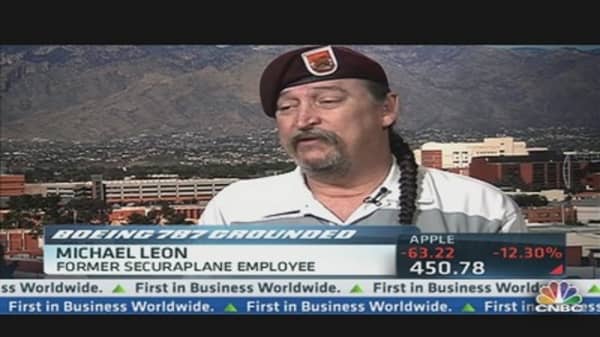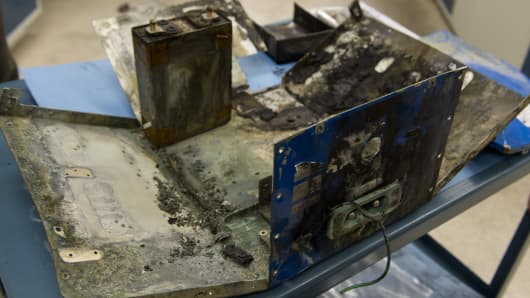Ever since the FAA grounded Boeing's Dreamliner, there have been renewed questions about the safety of using lithium-ion batteries to provide power on the 787. The primary concern is the potential flammability of the batteries.
(Read More:
Japan to Investigate Boeing 787 Battery Maker
)
Leon fears the worst for the Dreamliner if questions surrounding the 787's lithium-ion batteries are not resolved. "What concerns me is if this happens on the aircraft and they are flying over the ocean or something, everybody is going to die," he said.
Still Searching for a Cause
Meanwhile, in Washington, D.C., Hersman said the NTSB is still trying to determine the exact cause for two Dreamliner batteries catching on fire. One incident happened after a Japan Airlines 787 landed in Boston Jan. 7. The other happened during an All Nippon Airways flight in Japan on Jan. 16. In both cases, nobody was hurt.
"We know that the lithium-ion battery experienced a thermal runaway, we know that there were short circuits and we know there was a fire," Hersman said. What the NTSB does not know at this point is what exactly prompted the battery malfunctions.
(Read More:
787 Design Flaw Could Be Serious Trouble for Boeing: Aviation Expert
)
In briefing reporters, Hersman declined to say if she would feel comfortable clearing the Dreamliner to fly again. That decision will ultimately be made by the Federal Aviation Administration. While Hersman was careful not to call the Dreamliner unsafe, she made it clear the significance of battery problems on two Dreamliners cannot be overstated.
"This is an unprecedented event. We are very concerned," she said. "We do not expect to see fire events onboard aircraft. This is a very serious air safety concern and the FAA has taken very serious action."
People Will Flock to This Plane
One week after the FAA grounded the fleet of 50 Dreamliners currently in service, the eight airlines flying those planes remain supportive of Boeing and the eventual return of the 787. That includes United Airlines, the only U.S. carrier to fly the plane.
(Read More:
Airlines Stick With Boeing 787, Despite Problems
)
After reporting fourth-quarter earnings Wednesday morning, United Airlines CEO Jeff Smisek held a conference call with reporters. When asked if he's worried about customers avoiding flights on the Dreamliner when the grounding is ultimately lifted, Smisek said no.
"The aircraft is a terrific aircraft and customers love the airplane," Smisek said. "I have no doubt that customers will flock back to that airplane as soon as we get it back up again."
Investors also believe Boeing will eventually get past the Dreamliner grounding. One week after the FAA banned flights of the 787, shares of Boeing have gone up — a sign Wall Street and investors believe the Dreamliner will not ground Boeing's profitability.
(Read More:
Hold Boeing Stock Despite 787 Turbulence: Analysts
)
—By CNBC's Phil LeBeau; Follow him on Twitter
@LeBeauCarNews





